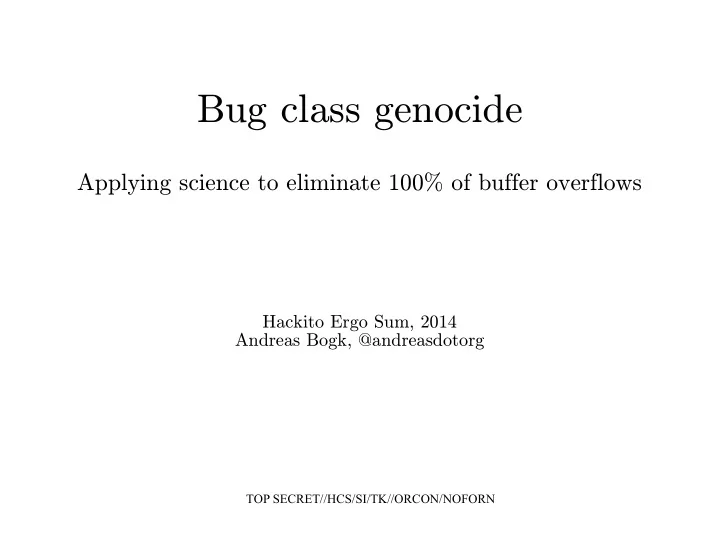

Bug class genocide Applying science to eliminate 100% of buffer overflows Hackito Ergo Sum, 2014 Andreas Bogk, @andreasdotorg TOP SECRET//HCS/SI/TK//ORCON/NOFORN
The problem void foo (char* arg) { char some[16]; char* p = some; while (*p++ = *arg++); } TOP SECRET//HCS/SI/TK//ORCON/NOFORN
The problem: spatial memory safety void foo (char* arg) { char some[16]; char* p = some; while (*p++ = *arg++); } TOP SECRET//HCS/SI/TK//ORCON/NOFORN
The other problem void bar (char* arg) { char* p = malloc(16); free(p); while (*p++ = *arg++); free(p); } TOP SECRET//HCS/SI/TK//ORCON/NOFORN
The other problem: temporal memory safety void bar (char* arg) { char* p = malloc(16); free(p); while (*p++ = *arg++); free(p); } TOP SECRET//HCS/SI/TK//ORCON/NOFORN
Existing approaches ● Use a safe language! ● Mitigations: ASLR, DEP, stack canaries ● Memory debugging tools: – Valgrind – gcc and llvm memory sanitizer – SAFEcode – Ccured – SafeC – Cyclone – Etc... – – TOP SECRET//HCS/SI/TK//ORCON/NOFORN
A word on notation red.is->compiler_generated(code); black.is->user_written(code); TOP SECRET//HCS/SI/TK//ORCON/NOFORN
Object-based approach if (IsPoisoned(address)) { ReportError(address); } *address = ...; // or: ... = *address; TOP SECRET//HCS/SI/TK//ORCON/NOFORN
Intrastructural safety struct { char id[8]; int account_balance; } bank_account; char* ptr = &(bank_account.id); strcpy(ptr, "overflow..."); TOP SECRET//HCS/SI/TK//ORCON/NOFORN
Pointer-based approach ● Every pointer represented by three words: pointer value, base, bound ● We call that a „fat pointer“ TOP SECRET//HCS/SI/TK//ORCON/NOFORN
Meet SoftBoundCETS ● Santosh Nagarakatte, Jianzhou Zhao, Milo M. K. Martin, Steve Zdancewic; UPenn ● SoftBound: spatial safety ● CETS: temporal safety ● Uses disjoint fat pointers ● Proof of correctness (but caveat emptor) ● Implemented as LLVM optimizer pass TOP SECRET//HCS/SI/TK//ORCON/NOFORN
Meet SoftBoundCETS ● Source compatibility ● Complete coverage ● Separate compilation ● Low overhead TOP SECRET//HCS/SI/TK//ORCON/NOFORN
Spatial: instrumenting dereference check(ptr, ptr_base, ptr_bound, sizeof(*ptr)); value = *ptr; TOP SECRET//HCS/SI/TK//ORCON/NOFORN
Spatial: implementation of check void check(ptr, base, bound, size) { if ((ptr < base) || (ptr + size > bound)) { abort(); } } TOP SECRET//HCS/SI/TK//ORCON/NOFORN
„ Beware of bugs in the above code; I have only proved it correct, not tried it. “ – Donald E. Knuth TOP SECRET//HCS/SI/TK//ORCON/NOFORN
Spatial: correct implementation of check void check(ptr, base, bound, size) { if ((ptr < base) || (ptr + size > bound) || (ptr + size < ptr)) { abort(); } } TOP SECRET//HCS/SI/TK//ORCON/NOFORN
Spatial: memory allocation ptr = malloc(size); ptr_base = ptr; ptr_bound = ptr + size; if (ptr == NULL) ptr_bound = NULL; TOP SECRET//HCS/SI/TK//ORCON/NOFORN
Spatial: stack allocation int array[100]; ptr = &array; ptr_base = &array[0]; ptr_bound = ptr_base + sizeof(array); TOP SECRET//HCS/SI/TK//ORCON/NOFORN
Spatial: Pointer arithmetic newptr = ptr + index; // or &ptr[index] newptr_base = ptr_base; newptr_bound = ptr_bound; TOP SECRET//HCS/SI/TK//ORCON/NOFORN
Spatial: narrowing struct { ... int num; ... } *n; ... p = &(n->num); p_base = max(&(n->num), n_base); p_bound = min(p_base + sizeof(n->num), n_bound); TOP SECRET//HCS/SI/TK//ORCON/NOFORN
Spatial: more narrowing struct { ... int arr[5]; ... } *n; ... p = &(n->arr[2]); p_base = max(&(n->arr), n_base); p_bound = min(p_base + sizeof(n->arr), n_bound); TOP SECRET//HCS/SI/TK//ORCON/NOFORN
Spatial: loading metadata int** ptr; int* new_ptr; ... check(ptr, ptr_base, ptr_bound,sizeof(*ptr)); newptr = *ptr; newptr_base = table_lookup(ptr)->base; newptr_bound = table_lookup(ptr)->bound; TOP SECRET//HCS/SI/TK//ORCON/NOFORN
Spatial: storing metadata int** ptr; int* new_ptr; ... check(ptr, ptr_base, ptr_bound, sizeof(*ptr)); (*ptr) = new_ptr; table_lookup(ptr)->base = newptr_base; table_lookup(ptr)->bound = newptr_bound; ● TOP SECRET//HCS/SI/TK//ORCON/NOFORN
Spatial: augmenting function calls int func(char* s) { ... } int value = func(ptr); int func(char* s,void* s_base,void* s_bound) { ... } int value = func(ptr, ptr_base, ptr_bound); TOP SECRET//HCS/SI/TK//ORCON/NOFORN
Spatial: loose ends ● Global variables ● Separate compilation and library code ● Memcpy() ● Function pointers ● Creating pointers from integers ● Arbitrary casts and unions ● Variable argument functions TOP SECRET//HCS/SI/TK//ORCON/NOFORN
Temporal: allocation ptr = malloc(size); ptr_key = next_key++; ptr_lock_addr = allocate_lock(); *(ptr_lock_addr) = ptr_key; freeable_ptrs_map.insert(ptr_key, ptr); ● TOP SECRET//HCS/SI/TK//ORCON/NOFORN
Temporal: dereference check if (ptr_key != *ptr_lock_addr) { abort(); } value = *ptr; TOP SECRET//HCS/SI/TK//ORCON/NOFORN
Temporal: pointer arithmetic newptr = ptr + offset; // or &ptr[index] newptr_key = ptr_key; newptr_lock_addr = ptr_lock_addr; TOP SECRET//HCS/SI/TK//ORCON/NOFORN
Temporal: free if (freeable_ptrs_map.lookup(ptr_key) != ptr) { abort(); } freeable_ptrs_map.remove(ptr_key); free(ptr); *(ptr_lock_addr) = INVALID_KEY; deallocate_lock(ptr_lock_addr); TOP SECRET//HCS/SI/TK//ORCON/NOFORN
Temporal: propagating metadata int** ptr; int* newptr; if (ptr_key != *ptr_lock_addr) { abort(); } newptr = *ptr; newptr_key = table_lookup(ptr)->key; newptr_lock_addr = table_lookup(ptr)->lock_addr; TOP SECRET//HCS/SI/TK//ORCON/NOFORN
Temporal: propagating metadata int** ptr; int* newptr; if (ptr_key != *ptr_lock_addr) { abort(); } (*ptr) = newptr; table_lookup(ptr)->key = newptr_key; table_lookup(ptr)->lock_addr = newptr_lock_addr; TOP SECRET//HCS/SI/TK//ORCON/NOFORN
Temporal: globals int var; // global variable ptr = &var; ptr_key = GLOBAL_KEY; ptr_lock_addr = GLOBAL_LOCK_ADDR; TOP SECRET//HCS/SI/TK//ORCON/NOFORN
Temporal: loose ends ● Threads. Shared state is evil. Zalgo, etc. ● Shared memory. Shared state... see above. TOP SECRET//HCS/SI/TK//ORCON/NOFORN
Own contribution ● Introduced two function attributes to control instrumentation process ● Ported SoftBoundCETS to FreeBSD ● Instrumented FreeBSD libc and executable startup code ● Deleted ton of now useless wrappers ● Goal: build all of FreeBSD world with safe memory access ● Status: PoC works! TOP SECRET//HCS/SI/TK//ORCON/NOFORN
Demo Time! ● Everybody loves a good demo! ● Sufficiently advanced technology is indistinguishable from a propery rigged demo. TOP SECRET//HCS/SI/TK//ORCON/NOFORN
Thanks and references ● SoftBoundCETS: http://www.cs.rutgers.edu/~santosh.nagarakatte/softbound/ ● SoftBoundCETS on FreeBSD: https://github.com/andreas23/freebsd/tree/softbounds ● Many thanks to Hannes Mehnert for joint work on FreeBSD port ● Many thanks to Santosh Nagarakatte, Milo M. K. Martin, Steve Zdancewic for answering questions and providing access to beta versions of code TOP SECRET//HCS/SI/TK//ORCON/NOFORN
Recommend
More recommend